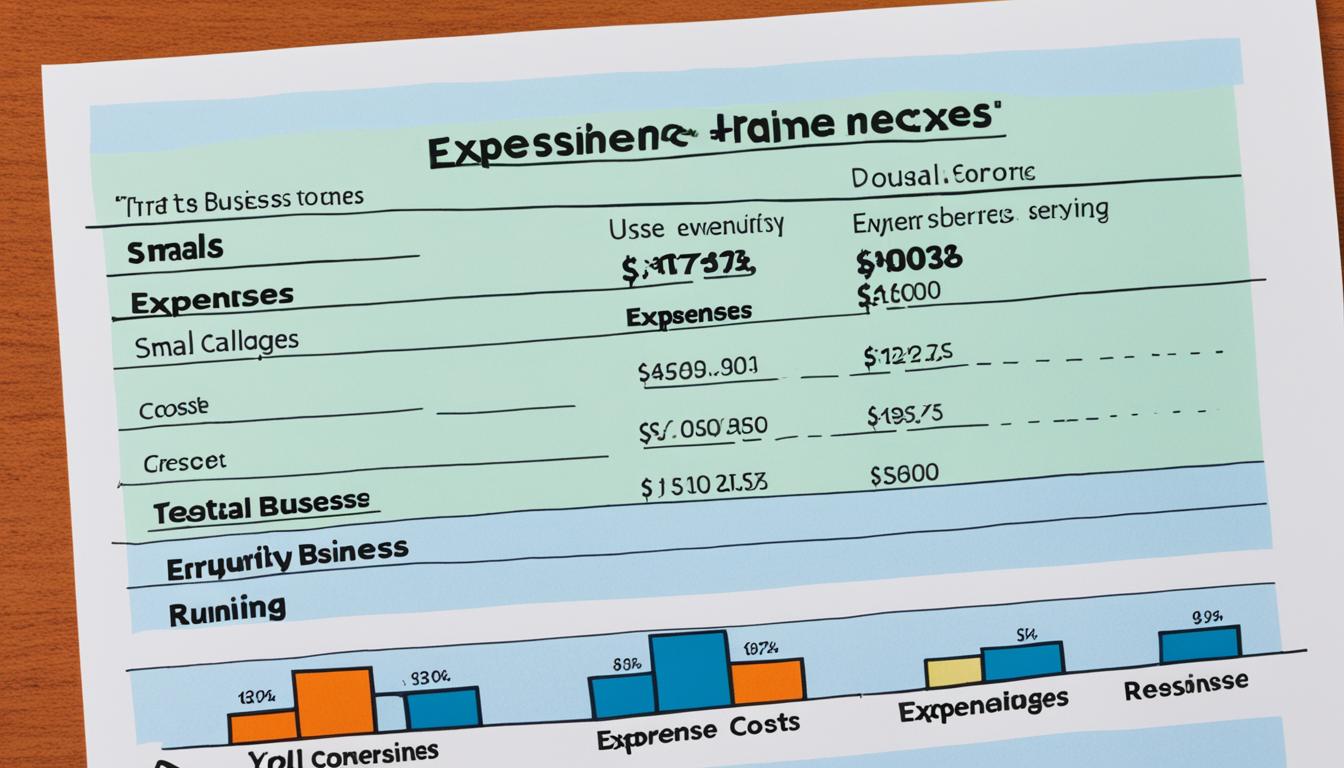Did you know that the average cost of starting a small business is around $30,000? According to a study by the Kauffman Foundations, which specializes in entrepreneurship research, this initial investment is just the tip of the iceberg. As each year passes, operating expenses tend to increase, making it essential for small business owners to have a solid understanding of running costs in order to plan for long-term profitability.
Key Takeaways:
- Starting a business can be costly and requires accurate calculation of startup expenses.
- A detailed business plan with financial projections is vital for estimating revenue, profit, and expenses.
- Common business startup costs include equipment, incorporation fees, office space, and inventory.
- Managing employee expenses, including salaries and benefits, is crucial for maintaining high morale and reducing turnover.
- Legal and accounting costs should be budgeted for to ensure compliance and sound financial management.
Calculating Business Startup Costs
When starting a business, it is crucial to have a clear understanding of the financial aspects involved. One of the most crucial steps in this process is calculating the startup costs. By accurately estimating the costs, you can develop a comprehensive financial plan and set a realistic budget for your small business.
To calculate the cost of starting a business, it is essential to create a detailed business plan. This plan should include a section dedicated to financial projections, estimating the revenue, profit, and expenses for the next three to five years. By forecasting the financial outlook of your business, you can gauge its feasibility and determine the level of investment required for success.
One valuable resource for startup financial planning is the Small Business Administration (SBA). The SBA provides comprehensive tools and resources, including startup cost worksheets, to help entrepreneurs estimate their initial investment costs accurately. These worksheets prompt you to consider various aspects of your business, such as equipment, marketing, licensing, and personnel expenses, ensuring you don’t overlook any crucial factors.
It is essential to consider both one-time costs and recurring expenses when calculating startup costs. One-time costs include expenses like incorporation fees, legal fees, equipment purchases, and initial inventory. Recurring costs encompass ongoing expenses like rent, utilities, office supplies, employee salaries, and marketing efforts.
“Accurate financial planning is the cornerstone of a successful startup.”
By diligently calculating your business startup costs, you can avoid financial pitfalls, maintain sound budgeting practices, and make informed decisions. Taking the time to estimate and analyze these costs will allow you to plan for the future, attract investors and funding, and ensure the long-term profitability and sustainability of your small business.
Example of a Startup Cost Estimation Table
| Expense Category | Estimated Cost Range |
|---|---|
| Incorporation Fees | $500 – $2,500 |
| Office Space Rent | $1,000 – $5,000 per month |
| Equipment and Supplies | $5,000 – $20,000 |
| Marketing and Advertising | $2,000 – $10,000 |
| Professional Services (Legal, Accounting) | $2,500 – $10,000 |
| Initial Inventory | $5,000 – $50,000 |
It is important to note that these estimations are just examples and actual costs can vary depending on various factors such as the industry, location, and scale of the business. Conducting thorough research and seeking professional advice will help you make more accurate estimations based on your specific circumstances.
As you can see, calculating business startup costs is a critical aspect of financial planning for small businesses. By forecasting and estimating these costs accurately, you can effectively budget and allocate resources to set your business up for success. Remember, monitoring and updating your financial projections will help you navigate any unexpected challenges that may arise along the way.
Business Startup Costs to Plan For
When starting a new business, it’s crucial to plan and budget for various startup costs. While these costs can vary depending on the industry and specific business, there are several common expenses that small enterprises should consider. By estimating these costs accurately, entrepreneurs can develop effective cost-saving strategies and ensure the smooth day-to-day operation of their business.
1. Equipment Costs
Setting up a new business often requires investing in equipment. The type and size of the business will determine the range of costs associated with this category. Equipment expenses can range from $10,000 to $125,000, depending on the specific needs of the business. It’s important to carefully assess the requirements and explore options for cost-effective equipment procurement.
2. Incorporation Fees
One of the initial steps in starting a business is incorporating it. Incorporation fees typically range from under $300 to $725, depending on the state and type of business entity chosen. These fees cover the legal process of establishing the business as a separate legal entity, protecting the owners’ personal assets.
3. Office Space Costs
Office space is one of the major expenses that small businesses need to consider. The cost of office space can vary significantly depending on factors such as location, size, and amenities. On average, small businesses can expect to pay between $100 to $1,000 per employee per month for office space. It’s essential to evaluate the needs of the business and find a balance between cost and functionality.
4. Inventory Costs
If the business involves selling physical products, allocating a budget for inventory is crucial. Inventory costs typically range between 17% to 25% of the overall budget. Business owners should carefully manage inventory levels, considering factors such as storage costs, demand fluctuations, and the need to avoid excessive stock that may tie up precious capital.
5. Other Costs to Consider
In addition to the above expenses, there are several other costs that small businesses should plan for:
- Marketing Expenses: Setting aside a budget for marketing activities is essential for promoting the business and attracting customers.
- Website Development Costs: In today’s digital era, having an online presence is crucial. Businesses should allocate resources for website development and maintenance.
- Office Furniture and Supplies: Furnishing and equipping the office with essential furniture and supplies is an often-overlooked expense.
By planning for these costs and exploring cost-saving strategies, small business owners can navigate the financial challenges of starting a new enterprise and optimize their day-to-day business expenditures.
“The bitterness of poor quality remains long after the sweetness of low price is forgotten.” – Benjamin Franklin
Managing Employee Expenses
When it comes to financial management for startups, one crucial aspect is minimizing business overhead costs, especially when it comes to managing employee expenses. Budgeting for employee costs is essential to ensure the smooth operation and long-term profitability of your business. Employee expenses, including payroll costs, can significantly impact your overall budget.
Payroll costs typically range from 25% to 50% of the total budget, depending on various factors such as company size, industry, and compensation structure. It’s crucial to compensate your employees adequately to maintain high morale, reduce turnover, and attract top talent. Additionally, providing employee benefits and perks can help retain valuable team members.
“Compensating employees adequately is crucial for high morale and reduced turnover.”
Benefits and perks can include health insurance, retirement plans, flexible work arrangements, paid time off, and professional development opportunities. Offering these incentives can make your business more attractive to potential employees, enhancing your reputation as an employer of choice.
However, it’s important to strike a balance between offering competitive compensation and managing costs. Conducting regular reviews of your employee expense budget and exploring cost-saving strategies can help minimize business overhead costs while still providing fair compensation and benefits.
Minimizing Employee Expenses: Tips and Strategies
- Conduct a comprehensive salary and benefits benchmarking analysis to ensure your compensation package aligns with industry standards.
- Consider implementing performance-based compensation structures, such as bonuses or commissions, to motivate employees and reward exceptional performance.
- Explore cost-effective alternatives for employee benefits, such as partnering with local healthcare providers for discounted health insurance rates or leveraging online platforms for affordable retirement plans.
- Implement efficient time-off policies and procedures to effectively manage paid time off without disrupting business operations.
- Encourage productivity and engagement through employee recognition programs and non-monetary rewards.
By carefully managing employee expenses, startups can optimize their financial resources, reduce business overhead costs, and foster a positive work environment. Prioritizing employee well-being and satisfaction while also being mindful of the bottom line is essential for long-term success.

Navigating Legal and Accounting Costs
Starting a business often involves various legal and accounting expenses that business owners need to navigate. Let’s explore the different costs and considerations for legal and accounting services to ensure the smooth operation of your small business.
Legal Costs
When starting a business, you may need to enlist the help of legal professionals to handle essential tasks such as drafting partnership agreements or articles of incorporation. These legal documents are crucial for establishing the legal framework and structure of your business.
Legal costs can vary depending on the complexity of your business and the specific services you require. It’s important to engage lawyers who are familiar with the regulations and local laws relevant to your industry. This will help you navigate through any legal challenges and ensure compliance with tax codes, grant opportunities, and other regulations that impact your business.
Consider negotiating fees with legal professionals to ensure that you receive fair and competitive pricing. Additionally, some organizations and universities may offer pro bono or discounted legal services, providing an opportunity to reduce your startup legal costs.
Accounting Expenses
Accurate financial record-keeping and accounting are vital for the success of any small business. Engaging professional accountants can help you effectively manage your finances, handle tax obligations, and ensure compliance with accounting standards and regulations.
The cost of accounting services for small businesses can vary based on factors such as the complexity of your financial transactions, the size of your business, and the level of expertise required. It’s important to select an accountant or accounting firm that specializes in small businesses and understands the unique challenges and opportunities they face.
When considering accounting expenses, weigh the potential benefits of professional services against the cost savings of managing your finances internally. While some small business owners may choose to handle their own bookkeeping and basic accounting tasks, it’s crucial to recognize the value of accurate financial reporting and seek professional assistance when necessary.
By navigating legal and accounting costs effectively, small business owners can ensure compliance, minimize risks, and focus on growing their businesses.

Comparing Legal and Accounting Costs
| Legal Costs | Accounting Expenses |
|---|---|
| Cost of drafting partnership agreements or articles of incorporation | Bookkeeping and financial record-keeping services |
| Regulatory compliance and tax advice | Tax preparation and filing services |
| Legal consultation for business decisions | Financial statement preparation and analysis |
| Contract drafting and review | Payroll processing |
| Licensing and permit applications | Budgeting and financial planning |
Hidden Costs of Running a Business
Beyond the obvious expenses, running a business entails several hidden costs that can catch small business owners off guard. Overlooking these hidden expenses can significantly impact the financial health and long-term profitability of a business. To ensure successful financial management, it’s important to identify and plan for these often overlooked business costs.
Permits, Licenses, and Dues
One of the hidden costs of running a business comes in the form of permits, licenses, and dues. Many industries require businesses to obtain various permits and licenses to operate legally. These permits and licenses often need to be renewed periodically, incurring additional costs. Furthermore, membership dues for professional organizations or industry associations are often necessary for networking and staying updated on industry trends and best practices.
Office Space and Utility Costs
Office space and utility costs can be substantial and easily overlooked when planning a budget. The rent or mortgage for a commercial space, along with utility bills such as electricity, water, and internet, can eat into the budget of a small business. However, there are ways to save on these costs. Negotiating lease terms, exploring temporary office space options, and implementing energy-saving measures can help reduce office space and utility expenses.
Equipment Maintenance and Upgrades
Proper equipment maintenance and necessary upgrades are often overlooked when considering business costs. Regular maintenance of equipment is essential to ensure its longevity and optimal performance. However, the cost of maintenance and repairs can add up over time. Additionally, technology and equipment become outdated, requiring businesses to invest in upgrades for improved efficiency and competitiveness. Factoring in these costs is crucial to maintain a sustainable operation.
Inventory Shrinkage
Inventory shrinkage, which includes theft, damage, and loss, is a hidden cost that can impact a business’s bottom line. Whether it’s due to internal or external factors, inventory shrinkage can lead to significant financial losses. Implementing inventory management systems, conducting regular audits, and implementing security measures are essential for minimizing inventory shrinkage and controlling associated costs.
Payment Delays and Credit Card Fees
Payment delays and credit card fees can also be overlooked when assessing business costs. Late payments from clients or customers can disrupt cash flow and lead to financial challenges. Additionally, fees associated with credit card transactions, especially for small businesses, can add up over time. Businesses should strive to establish clear payment terms, streamline invoicing processes, and consider alternative payment methods to mitigate these costs.
| Hidden Business Cost | Impact on Business |
|---|---|
| Permits, Licenses, and Dues | Legal compliance, networking opportunities, and industry updates |
| Office Space and Utility Costs | Financial burden, potential cost-saving measures |
| Equipment Maintenance and Upgrades | Long-term equipment performance and competitiveness |
| Inventory Shrinkage | Loss of profit, inventory management strategies |
| Payment Delays and Credit Card Fees | Cash flow disruption, alternative payment methods |
Conclusion
Starting and running a small business entails careful financial planning and budgeting. By accurately calculating startup costs, managing employee expenses, navigating legal and accounting costs, and being aware of hidden expenses, small business owners can work towards financial success.
It is crucial to regularly review expenses, negotiate where possible, and plan for unexpected costs to ensure the business’s long-term profitability and sustainability. By staying on top of expenses and implementing cost-saving strategies, small business owners can optimize their operations and maximize their profits.
Furthermore, small business owners should consider seeking professional advice from lawyers and accountants to navigate the legal and financial complexities of running a business. Negotiating fees and exploring pro bono or discounted services can help minimize legal and accounting expenses, freeing up resources for other crucial aspects of the business.
In conclusion, financial management is a critical aspect of running a successful small business. By understanding and carefully planning for the various expenses involved, small business owners can build a solid foundation for long-term growth and profitability.
FAQ
What are the average running costs for a small business?
The average costs of starting a business are around ,000. However, running costs can vary depending on the industry and specific business.
How do I calculate business startup costs?
To calculate startup costs, create a detailed business plan with financial projections for the next three to five years. Consider both one-time costs like incorporation fees and recurring costs like rent and office supplies. Resources like startup cost worksheets from the Small Business Administration (SBA) can help estimate initial investment costs.
What are the common costs to plan for when starting a business?
Common costs to plan for include equipment costs, incorporation fees, office space costs, inventory costs, marketing expenses, website development costs, and office furniture and supplies.
How much should I budget for employee expenses?
Payroll costs can range from 25% to 50% of the total budget, including salaries, bonuses, commissions, and paid time off. It’s important to adequately compensate employees and consider providing benefits and perks to retain them.
What legal and accounting expenses should I expect when starting a business?
Legal and accounting expenses can include fees for drafting partnership agreements or articles of incorporation. Hiring professionals can help navigate regulations, tax codes, and grant opportunities. It’s important to negotiate fees and consider pro bono or discounted rates.
What are the hidden costs of running a business?
Hidden costs include permits, licenses, and dues that need to be renewed periodically. Office space and utility costs, equipment maintenance, inventory shrinkage, payment delays, and credit card fees can also impact a business’s bottom line.


